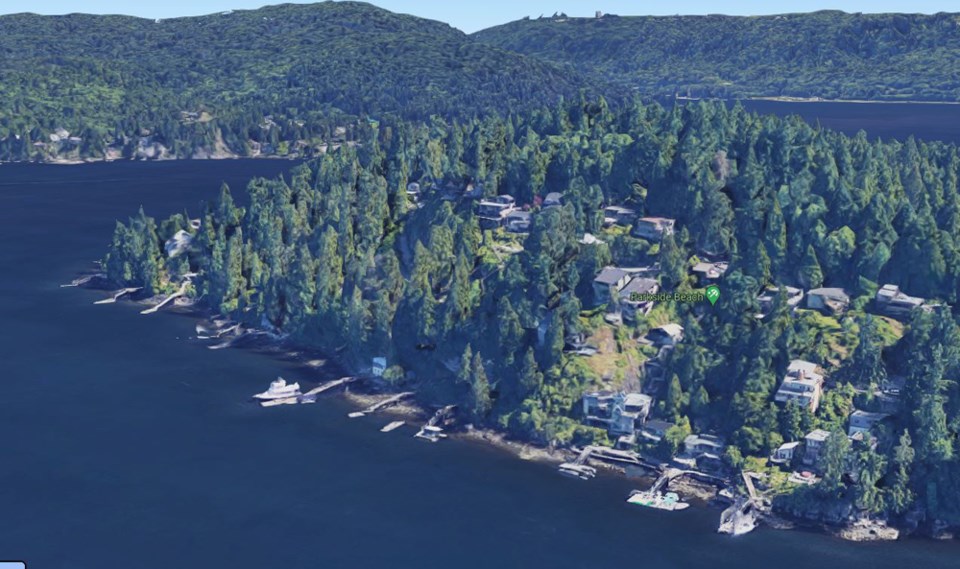A Deep Cove strata has been ordered to install a hillside tram to assist a senior resident who has been housebound for more than two years.
Gerald Testar, 84, took his Eastridge Road strata to the B.C. Human Rights Tribunal, arguing their refusal to install a tram amounted to discrimination on the basis of disability.
Testar’s home is unique in the four-lot North Vancouver subdivision in that it is landlocked at the bottom of seven flights of stairs, containing 102 steps, connecting it to the parking lot, according to a tribunal ruling released May 18.
With numerous heart and lung ailments, vertigo, and arthritis in his knee and ankle, Testar found it was no longer safe to go up and down the stairs. His last outing was for a family visit in December 2019. The following month, he formally requested the strata install a tram from a company he had chosen.
But the strata members opposed the installation of the tram running through common property, arguing it would negatively impact the property and that it wasn’t a reasonable request.
The strata asserted that a commercial-grade tram available to all residents would be required on the common property and the company Testar had chosen would not meet those requirements. Instead, the council proposed a series of workarounds, including more ramps and places to sit, or a powered chairlift added to the existing stairs.
Apart from the costs, neighbours within the strata testified the tram would be noisy and impact the look of their property, as well as diminish views and create potential encroachments on their lots, the ruling shows.
In January 2021, the strata voted to accommodate Testar with a chairlift system, which would result in a $17,500 levy for each strata owner.
But the chairlift option would be too difficult to get into and out of, Testar argued, and too slow, exposing him to the elements. The chairlift would require a trained operator and, not only would it be impossible for him to use in a medical emergency, it may impede first responders from carrying him up the stairs. He also argued that there was no confirmation the staircase itself would be safe or feasible to have a chairlift installed because an inspection commissioned by the strata found the staircase was built without a permit and did not meet current code, the ruling states.
The tram could accommodate up to four people and make the trip in about 90 seconds, the ruling notes. The most recent quote for a tram came in at more than $151,000. Testar proposed they go ahead with the tram option and offered to pay any costs above the $17,500 per owner levy, and indemnify the strata for any insurance and maintenance costs.
The strata never responded to the offer, and the sides were at an impasse when Testar filed a B.C. Human Rights Tribunal complaint.
During the tribunal’s hearings, Testar illustrated how the strata’s decisions had impacted him.
“I look out the window and I can't go shopping. I lack access to the meaning of the world out there. My wife Coralee had a stroke in the hospital and I am not able to visit her at all. I have lost my connection to community,” he testified. “I feel isolated and I fight depression on a daily basis. I like to interact with people in the community. I like to shop. I have to rely on family to take out the garbage. I do not have any independence.”
In her ruling, tribunal member Amber Prince said there was no question Testar would be considered disabled under the law, and that the strata had a duty to accommodate him. The plan to install a chairlift was inadequate, she found, for all the reasons Testar argued.
Prince’s order gives the strata six months to “make all reasonable efforts to approve and build the tram that Mr. Testar seeks as soon as reasonably possible.”
Prince also ordered the strata to pay Testar $35,000 as compensation for injury to his dignity, feelings and self-respect, acknowledging that the strata took a “resistant and inflexible approach,” leaving Testar “essentially a prisoner in his own home.”
“In the context of Mr. Testar’s age, progressive health conditions and limitations, the nature of the discrimination is serious, and has had a significant impact on Mr. Testar,” she wrote, adding later: “No one should have to spend their golden years fighting with their strata to have their accommodation needs met.”



